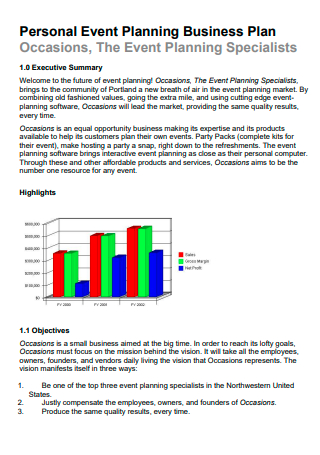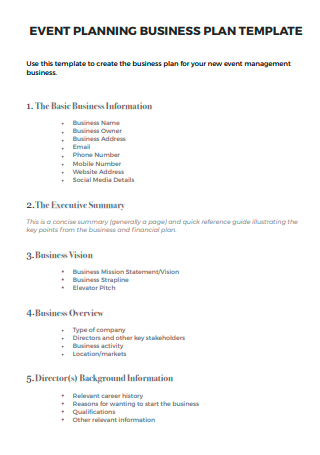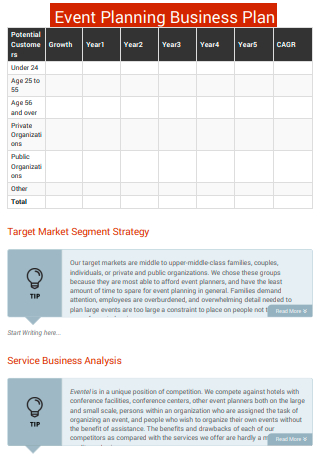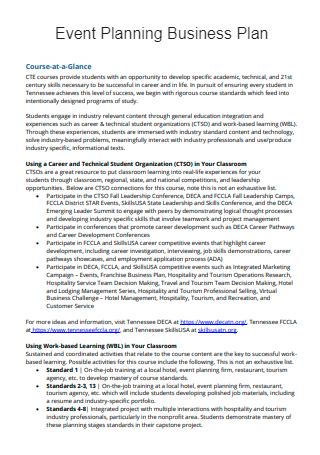3+ Sample Event Planning Business Plan
FREE Event Planning Business Plan s to Download
3+ Sample Event Planning Business Plan
What Is An Event Planning Business Plan?
Is Event Planning A Profitable Business?
What Is The Best Thing About Event Planning?
What Is The Downside of Event Planning?
5 Essential Elements Of Event Planning:
What Should Be In The Refund And Cancellation Policy?
FAQs
How much do event planners cost?
What are the skills that an Event Planner should have?
Is it possible to create an event in 7 days?
How do you keep budgets on track?
How early do we need to start planning an event?
Can you cope with last minute changes of plan?
What Is An Event Planning Business Plan?
An Event Planning Business Plan is a business that involves budgeting, choosing and reserving the event sites, establishing timelines, acquiring permits, planning food, developing a theme, coordinating transportation, selecting speakers and keynotes, arranging activities, arranging for equipment and facilities, managing risk, and developing contingency plans.
This business is when you are coordinating and facilitating events like a wedding, a conference, a corporate fundraiser, a trade show, a birthday, and other occasion. Event planning consists of correlating every detail of conventions and meetings, from the speakers and team meeting minutes location to scheduling for materials and audio-visual equipment.
Is Event Planning A Profitable Business?
Before starting an Event Planning Business, set aside at least $15,000 to $25,000 to start a small business. In the long run, with your full determination and good financial management, this can be quite a profitable career choice. The best event planners will make a name for themselves and be able to charge high prices for their creativity, vision, execution, and results.
What Is The Best Thing About Event Planning?
The best thing about event planning is the invigorating art of choreographing people and activities in order to create a show that builds up memories of a lifetime. Producing and designing an event, whether it is a meeting, corporate event, fundraiser, trade show, or any other event, in many ways is comparable to directing a live stage performance por a concert. Additionally, for those who love to travel, this provides an amazing opportunity to travel to classy and elegant hotels, interesting new places and get to know speakers and attendees from around the world. All of this, while enjoying a high level of autonomy and independence.You should also take a look at our performance plan.
What Is The Downside of Event Planning?
Event planning can be a stressful work of planning meetings and events, and it can be a very demanding career choice. The planners must multi-task on a lot of things at one time, face countless deadlines, and put together the activities of many diverse groups of people. Daily Planners may need to travel widely to attend meetings and to visit prospective meeting sites. Working hours can be long and irregular, and working for more than 40 hours per week is fairly common, especially during the time leading up to an event and wrapping up after the event. Lastly, you should be prepared for some physical activity, which means long hours of walking and standing, carrying of boxes of materials, guiding other workers, and so much more.
5 Essential Elements Of Event Planning:
What Should Be In The Refund And Cancellation Policy?
You must clearly state if returns, exchanges, and refunds are allowed in your event planning business. Include the number of days your client have to ask for a refund or cancellation. You may also state the services that is exempted from refund or cancellation. You may also be interested in our Cancellation Policy.
FAQs
How much do event planners cost?
An average event planner should charge between 15% to 20% of the total cost of an event as a part of their fee. It also depends on the complexity of the program and the amount of time it takes to plan and execute an event. Oftentimes, this is enough to cover a planner’s entire cost and source of profit. Moreover, a common hourly rate can fall within %25/hr for a new planner, and could go upwards of $100+/hr for top event planners with amazing portfolios. Basically, planners can charge about 30% more for a corporate event than a social event.In addition, you should review our profit and loss statement.
What are the skills that an Event Planner should have?
The lifelong success of an event planning business will be based on the experience that the planner brings to the clients. Which means, if you are thinking about having an event planning business, you should have a solid grasp as to what an event planner is, and make sure to have these solid skills:
Verbal and written communications. Developing communication skills can help many aspects of your life—your professional career, to social gatherings, to your family life. This skill is essential in order to understand and deliver information quickly and accurately. Being able to communicate effectively is an important life skill and should not be overlooked.
Organizing and time management. Being highly organized allows you to quickly find anything that you need, whether it is an email you received a year ago or a contract that you signed yesterday. A time management plan can help you to break down large goals into smaller ones, which results to it being easily achievable tasks and forces you to complete those tasks on schedule.
Negotiation and budget management. When it comes to negotiating, there is nothing wrong with asking your client. You need to know exactly what you need so, when you make an appointment, be prepared with your data and reports to back up your statements. Conduct your own research as well to get to know more about the budget of your client. Focus on your strengths or what you can offer because most planners experience more demands of their time. On the other hand, budget management is the process of tracking and managing income and expenses. This involves conscious decision making about allocation of money such that expenditures do not exceed the income. If in any case resources are not enough, an individual with ideal budgeting skills shall be able to focus and prioritize the spending on the things that are most important.
Creativity, marketing, public relations, and more. Creativity helps develop new ways of improving and developing an existing product or service to boost the business. This allows planners to think outside the box and beyond the traditional solutions making it an opportunity to new, interesting, potential yet adaptable idea to come up. Another factor that helps the success in the business is Marketing. This refers to all activities an event planner does to promote and strategic campaign plan about the services. This helps identify its ideal customers, and even draw the customers’ attention to the service being offered. While in Public Relations, it is a strategic communication that builds mutually beneficial relationships between organizations. This build bridges of goodwill, understanding, and awareness between a company and the public that wishes to influence.
Is it possible to create an event in 7 days?
It depends on the nature of the event but ideally, there should be 4-6 months to plan. Most convention, meetings, and event planners work full time, and many work for more than 40 hours per week. They often work longer hours to finalize preparations as the major event approaches.
How do you keep budgets on track?
Check your account statements. Pinpoint your money habits by taking inventory of all of your accounts, including checking your account and all credit cards you have. Looking at your accounts will help you identify your spending habits.
Categorize your expenses. You may start by grouping your expenses. There are some credit cards that automatically tag your purchases in categories like automotive or department store. Your spending will consist both fixed expenses and variable expenses. The fixed expenses are less likely to change from month to month. They include mortgage or rent, insurance, utilities, and debt payments. You will have more room to adjust variable expenses like food, clothing, and travel.
Make use of budgeting or expense tracking app. Budgeting apps are designed for money management, allowing to allocate a certain amount of spendable income each month depending on what you are taking in and what you are paying out.
How early do we need to start planning an event?
It is never too soon to start! The time to plan events differs from a few weeks to years. If an event is small, it can be put together within a month or two. A good rule of thumb for any major event like weddings or company holiday parties is approximately around six months.
Can you cope with last minute changes of plan?
Probably the most important thing to do in order to handle last minute changes is to be prepared. As an event planner, identify the areas that may be most subject to sudden changes and create backup plans for each. Make sure to get control of your emotions, compose yourself, and speak with the client what needs to be done. It is important that you communicate well to avoid conflict. Raise questions and concerns just in case you won’t be able to accommodate certain changes because of its difficulty or it requires too much time and effort.
Celebrating different kinds of occasion have become more and more expensive and aesthetic. We all like to celebrate even the small wins in life. Most people want everything to be memorable and cherished. Celebrations have become a part of people’s lives where from the birth of the first child, up to the first birthday, graduation, wedding, and/or job promotion, everything is celebrated and events are just everywhere.
Because of this culture happening worldwide, a lot of people have discovered a great career in planning events. They are the ones who celebrate with those who celebrate. The Event Planning industry became popular instantly as they make people’s dream weddings come into reality and they just have more to offer. It is important for any types of businesses to be ready and be well-equipped especially if your business is an Event Planner. In order to achieve the expectations of your clients or customers, you must always be ready with a plan.




